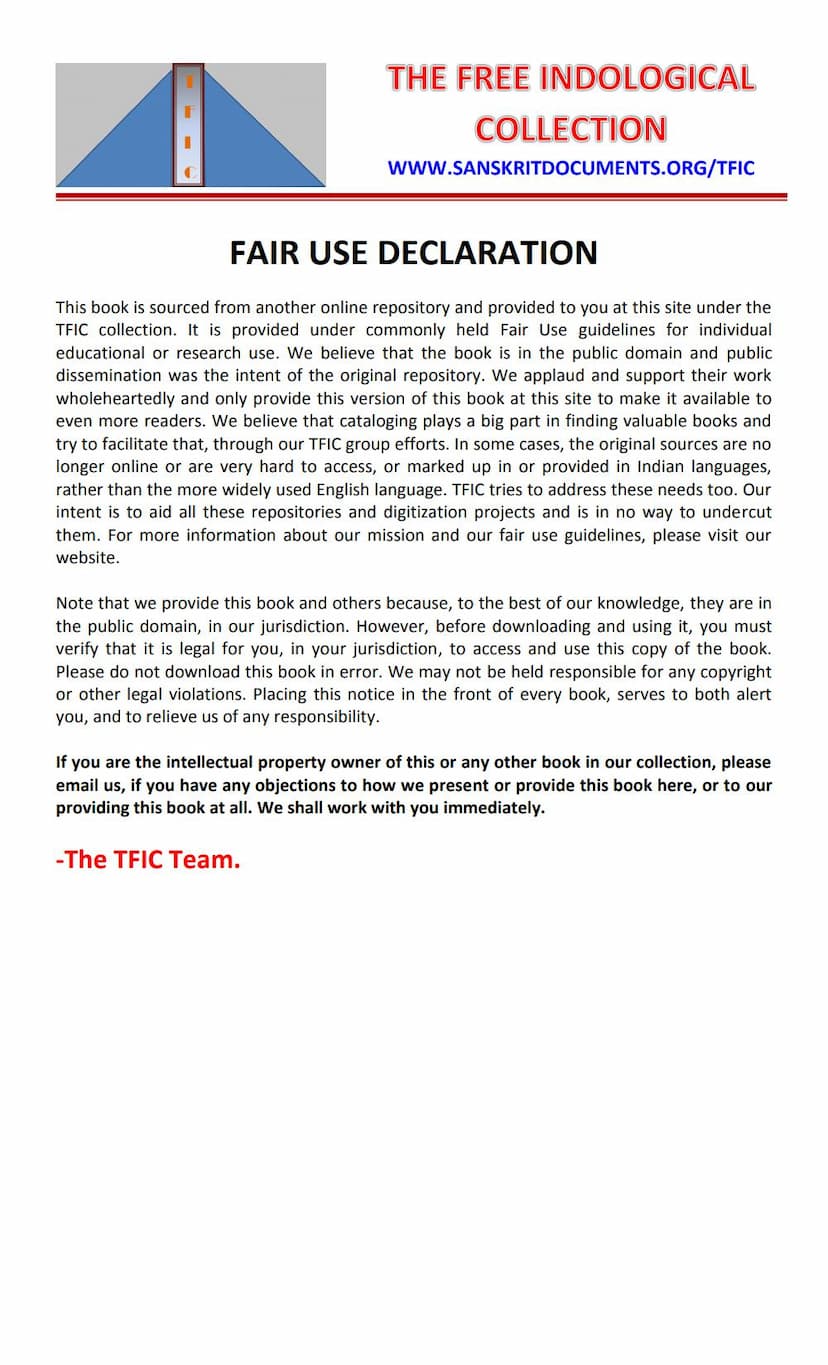Tattva Chintamani Shabdakhandam
Added to library: September 2, 2025

Summary
Here's a comprehensive summary of the Jain text "Tattva Chintamani Shabdakhandam" by Ganesh Upadhyay, based on the provided catalog link and the text snippets:
Book Title: Tattva Chintamani Shabdakhandam Author: Ganesh Upadhyay Publisher: Ganesh Upadhyay Catalog Link: https://jainqq.org/explore/010078/1
Overall Nature of the Text:
The Tattva Chintamani is a highly significant and foundational work in Navya-Nyaya (New Logic) philosophy, authored by Gangesa Upadhyaya. The Shabdakhandam is the fourth section (Khanda) of this monumental work, dedicated to the critical examination and validation of Shabda (Word/Verbal Testimony) as a source of valid knowledge (Pramana) within the Indian philosophical tradition. This particular volume, based on the provided title and publisher information, focuses on the "Shabdakhandam," specifically covering the arguments from "Shabdapramanavada" (On the validity of Verbal Testimony) up to "Uchchhinna-Prachchhinna Vada" (Arguments related to the interrupted and interrupted parts of the speech).
The text presented in the excerpt is a commentary on Gangesa Upadhyaya's Shabdakhandam, featuring the commentary of Mathura Natha Tarkavagisa and edited by Kamakhya Natha Tarka Vagisa. This indicates a deep dive into the intricacies of Gangesa's arguments, employing sophisticated logical and epistemological frameworks.
Key Themes and Arguments Discussed (Based on the provided snippets):
The Shabdakhandam and its commentary address fundamental questions in Indian epistemology regarding verbal testimony. Here are the core themes and arguments likely covered, as suggested by the chapter titles and introductory remarks:
-
Definition and Nature of Shabda Pramana:
- The text begins by defining Shabda as a source of valid knowledge, likely focusing on the meaning derived from words and sentences. The definition presented is: "प्रयोगहेतुभूतार्थतत्वज्ञानजन्यः शब्दः प्रमाणम्" (Shabda is a source of knowledge that arises from the knowledge of the true nature of the intended meaning, which is the cause of its utterance/use).
- It explores the connection between the utterance of words, the intention of the speaker, and the subsequent understanding of the listener.
-
Arguments for the Validity of Shabda (Shabdapramanyavada):
- The primary debate is whether verbal testimony itself is a source of valid knowledge or if its validity is derived from other sources like perception or inference.
- Rejection of other schools' views: The text likely engages with and refutes arguments from Mimamsa (Prabhakara and Bhatt schools) and Buddhism (especially regarding the nature of words and their meanings, and whether they are eternal or impermanent).
- Mimamsa views: Mimamsa tradition generally upholds Shabda as an independent source of knowledge, emphasizing the eternality of words (Shabda Nityatvavada). Gangesa, as a Nyaya philosopher, might present a slightly different perspective or refine the Mimamsa arguments.
- Buddhist views: Buddhists, particularly Madhyamikas, often questioned the ultimate reality of external phenomena and thus the validity of testimony pointing to them. They might argue for the conventional validity of language but not ultimate truth.
- Gangesa's stance: Gangesa, in the Nyaya tradition, would likely defend the inherent validity of Shabda, often relying on the authority of the speaker (Apta) and the absence of contradictions. He would establish its validity through careful analysis of semantic relations, sentence construction, and the intention behind the utterance.
-
Key Concepts and Debates:
- Yogyata (Competency/Fitness): This refers to the relationship between words and their meanings, ensuring that the words convey a coherent and sensible meaning. The discussion likely revolves around what constitutes 'competency' in a sentence.
- Aasatti (Relation/Connection): This pertains to the sequential and meaningful connection between words in a sentence and their contribution to forming a sentence-meaning.
- Tatparya (Intention/Purpose): The speaker's intention is crucial for understanding the intended meaning of a sentence, especially in cases of ambiguity or when words have multiple meanings. This involves understanding the speaker's purpose (Pravṛtti-niyojaka).
- Paurushayavada vs. Apaurusheyavada: Gangesa likely addresses the debate between the view that words/sentences are produced by a conscious author (Paurushaya) versus the view that they are unauthored (Apaurusheya), a significant point in the Mimamsa debate concerning the Vedas. Gangesa, in the Nyaya tradition, would likely align with the Nyaya view that the Vedas are authored by Ishvara (God).
- Nityatva vs. Anityatva of Shabda: The debate on whether words (and their meanings) are eternal (Nitya) or momentary/impermanent (Anitya) is a central epistemological issue. The text would delve into arguments and counter-arguments for both positions.
- Uchchhinna-Prachchhanna Vada: This refers to specific types of arguments or rhetorical strategies concerning partially understood or implied meanings, which are likely analyzed in relation to verbal testimony.
Significance of the Work:
- Gangesa Upadhyaya's Tattva Chintamani is considered a masterpiece of Indian logic and epistemology. Its Shabdakhandam specifically offers a rigorous and detailed analysis of verbal testimony, influencing subsequent generations of philosophers.
- The commentaries by Mathura Natha Tarkavagisa and Kamakhya Natha Tarka Vagisa provide valuable insights into interpreting Gangesa's complex arguments, making the text accessible to advanced students of Indian philosophy.
- The text engages with diverse philosophical schools, demonstrating a comprehensive understanding of the intellectual landscape of its time.
In Summary:
The Tattva Chintamani Shabdakhandam by Ganesh Upadhyay, as presented through its commentary, is a profound philosophical treatise that meticulously dissects the nature and validity of verbal testimony as a source of knowledge. It systematically argues for the epistemological significance of Shabda, engaging with and refuting rival philosophical views, and establishing its unique place within the Indian epistemic framework. The work is characterized by its logical rigor, detailed analysis of concepts like Yogyata, Aasatti, and Tatparya, and its exploration of the eternality or impermanence of words. It remains a crucial text for understanding the development of Nyaya philosophy and Indian epistemology.